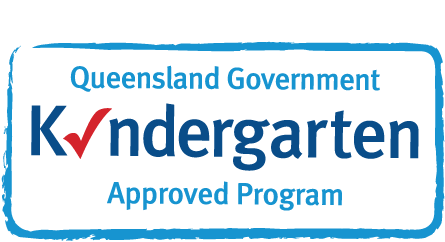We are enjoying the last days of winter at Kindy, soaking up the soft sunshine and deep blue skies before summer returns with its heat and promises of storms and rain.
Budding the beehive
Our beehive is going well, with many sightings of tickle bees gathering at the hive opening in the mornings. “They’re waiting for it to be warm enough,” shares one knowledgeable friend. The magic number is 18 – 18 degrees before native bees will venture out of their warm home. Some children have learned to sit and wait in front of the hive, to be rewarded by a gentle swarm settling on their skin, tickling as they land, walk around and then fly off in search of a better flower. Rod, our resident advisor, thinks they’ll start working on constructing their new hive and filling it with brood when the weather warms up – we’re checking through the window and can’t wait to watch it develop.
Coronavirus arts project
Our Pandemic Art Project is finished and all artwork sent to the State Library for processing. We will hear from Barbara if there is to be an exhibition and any special events associated with it. We are very proud of our young artists, both those involved in this project and those who create just for themselves at Kindy.
Uni Students
Our uni student, Tom, starts on Monday next week and will spend 15 days with us. As this is his first prac he is feeling excited and quite nervous, and is looking forward to building his understandings about how children learn through play.
Imaginative Play
Our children are so independent in their play these days, choosing what and where to play, accessing resources they need from the shed and natural objects from the garden and sharing ideas and negotiating roles with their friends. Every day there’s so much imaginative play, some based on recurring themes and some that are purely of the moment. I enjoyed the band of friendly pirates, a game which quite quickly changed to a family of friendly parrots – that shows our bird-centric interests in Blue Group! The parrot family shared responsibility for sitting on their eggs and feeding their babies nectar. One entrepreneurial parrot had a sideline making lollypops using honey and twigs, the major selling point being “when you’re finished just throw it on the ground, there’s no rubbish for the bin!”.
There’s been endless reworkings of “families” games (human and nonhuman), witches and wizards, pretend construction projects, camping make believe, doctors and patients, rubbish truck drivers, vets and teachers, and more.
Why is imaginative play so important? At the core of it is children making sense of their world, playing with ideas and roles, re-enacting stories and scenes and recombining them in new ways to understand them. Imaginative play with peers adds extra complexity as they “experiment with and learn about the power of language” (pentagonplay.co.uk). Sometimes things go wrong and so children have to problem-solve to continue playing. This can involve negotiation, compromise and self-regulation, all vital social and emotional skills. Pretend play often involves lots of physical play and use of gross motor skills. Imaginative play brings all the areas of development together in one fun context. There is a fantastic article about imaginative play at www.pentagonplay.co.uk/news-and-info/why-pretend-play-is-important-to-child-development.
Free Discussion
We’ve enjoyed some amazing discussions and subsequent explorations about a wide range of subjects: jellyfish - how do they know where they’re going? And why it’s a problem that plastic bags look like jellyfish when they get into the ocean; a discussion about the concept of perspective - that the world to a dog may look very different to the world viewed by a mouse or a fish or a bee; wondering how the moon stays up, why air doesn’t get through our skin and how the clouds make rain; about how the earth makes different kinds of rocks. These free discussions are so important as they nurture a sense of wonder, the driver of curiosity and the desire to learn. They can learn to value ideas, to think independently, critically and creatively. They develop their language, vocabulary, their understandings about the world, and their sense of well-being as their ideas are validated by others.
Bush Kindy
Bush Kindy has been amazing, we loved our first site and we’re sorry to leave it behind, but our new location is twice as large and full of different, interesting areas for play and exploration. While the first site had the beloved bouncy vines the new place has the jungle AND the fig tree with giant buttress roots AND the mysterious rocky gully AND an area where you can dig for worms.... there’ll be plenty of happy learning and adventure in this place for sure. Big thank you to Tracy for her terrific leadership and for sharing what we’ve been doing each week via Facebook.
Thank you
To Julie and Tim Lewsey for obtaining our new drum water tanks via a Bunnings grant. These will be located next to the sandpit and will collect rainwater from the sandpit roof. Fitted out with a tap the children will be able to independently access water for play. The tanks can also be filled via the hose. We can’t wait to use them once installed!
To families who’ve volunteered at Bush Kindy - we appreciate the support and attention you give to the children’s learning there.
To our committee for keeping things running smoothly.
To our staff for going above and beyond on a daily basis to support our children and the Kindy.


